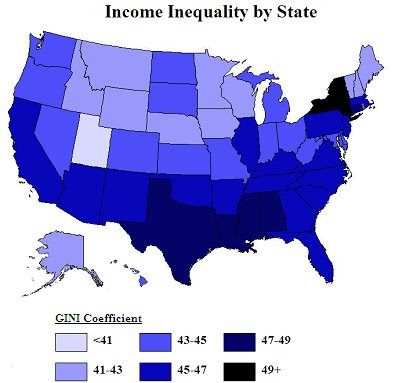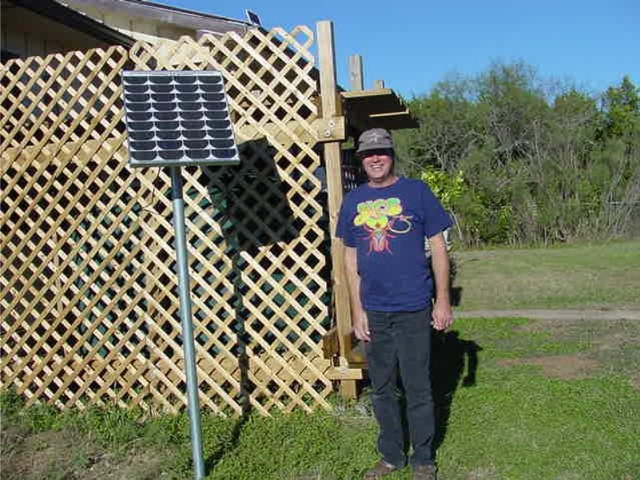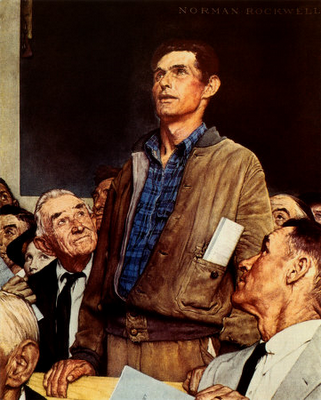
This article isn't new, but it's some interesting data. Here in the US we stand alone among developed nations in terms of the sheer gap we have between the rich and everyone else.
So the higher the number, the more wealth inequality there is. For most advanced industrial economies, the Gini number is pretty low. According the the CIA World Factbook (table compiled here), the lowest Gini score in the world is Sweden's, at .23, followed by Denmark and Slovenia at .24. The next 20 countries are all in either Western Europe or the former Communist bloc of Eastern Europe. The EU as a whole is at .307. Russia has the highest number in Europe (.41); Portugal is the highest in Western Europe (.38). Japan is at .381; Australia is .352; Canada is .321.
http://mapscroll.blogspot.com/2009/04/is-us-becoming-third-world-country.html
Wow, we don't even have one state that even approaches Canada in income equality.
Here's the list, which 3rd world nation does your state compare to?
And then there is the United States, sandwiched between Cote d'Ivoire and Uruguay at .450. Not counting Hong Kong (.523), the US is a complete loner among developed countries. In fact, as you can see from the map above, there is no overlap between any single US state and any other developed country; no state is within the normal range of income distribution in the rest of the developed world. Here's a list of the states with their Gini index numbers, and the country where income distribution is most comparable in parentheses:
Alabama - .472 (Nepal)
Alaska - .417 (Cambodia)
Arizona - .454 (Jamaica)
Arkansas - .460 (Ecuador)
California - .466 (Rwanda)
Colorado - .450 (Uruguay)
Connecticut - .480 (Venezuela)
Delaware - .434 (Guyana)
District of Columbia - .537 (Honduras)
Florida - .467 (Rwanda)
Georgia - .461 (Mexico)
Hawaii - .438 (Nigeria)
Idaho - .421 (Thailand)
Illinois - .462 (Malaysia)
Indiana - .432 (Guyana)
Iowa - .424 (Burundi)
Kansas - .441 (Kenya)
Kentucky - .460 (Ecuador)
Louisiana - .475 (Madagascar)
Maine - .428 (Singapore)
Maryland - .433 (Guyana)
Massachusetts - .461 (Mexico)
Michigan - .444 (Philippines)
Minnesota - .430 (Iran)
Mississippi - .471 (Nepal)
Missouri - .449 (Cote d'Ivoire)
Montana - .426 (Singapore)
Nebraska - .430 (Iran)
Nevada - .434 (Turkey)
New Hampshire - .417 (Cambodia)
New Jersey - .458 (Uganda)
New Mexico - .457 (Uganda)
New York - .495 (Costa Rica)
North Carolina - .458 (Uganda)
North Dakota - .434 (Guyana)
Ohio - .449 (Cote d'Ivoire)
Oklahoma - .460 (Ecuador)
Oregon - .444 (Kenya)
Pennsylvania - .455 (Jamaica)
Rhode Island - .442 (Philippines)
South Carolina - .462 (Mexico)
South Dakota - .439 (Nigeria)
Tennessee - .468 (Rwanda)
Texas - .474 (Mozambique)
Utah - .410 (Russia)
Vermont - .420 (Thailand)
Virginia - .456 (Uganda)
Washington - .443 (Kenya)
West Virginia - .447 (Cameroon)
Wisconsin - .424 (Burundi)
Wyoming - .413 (Senegal)
Obviously, the US is far wealthier than any of the countries to which states are being compared on this list; but it's striking to see the US fit a pattern which, outside of the US, is exclusively a phenomenon of the underdeveloped world.
http://mapscroll.blogspot.com/2009/04/is-us-becoming-third-world-country.html







 That chart will only get worse...
That chart will only get worse...

